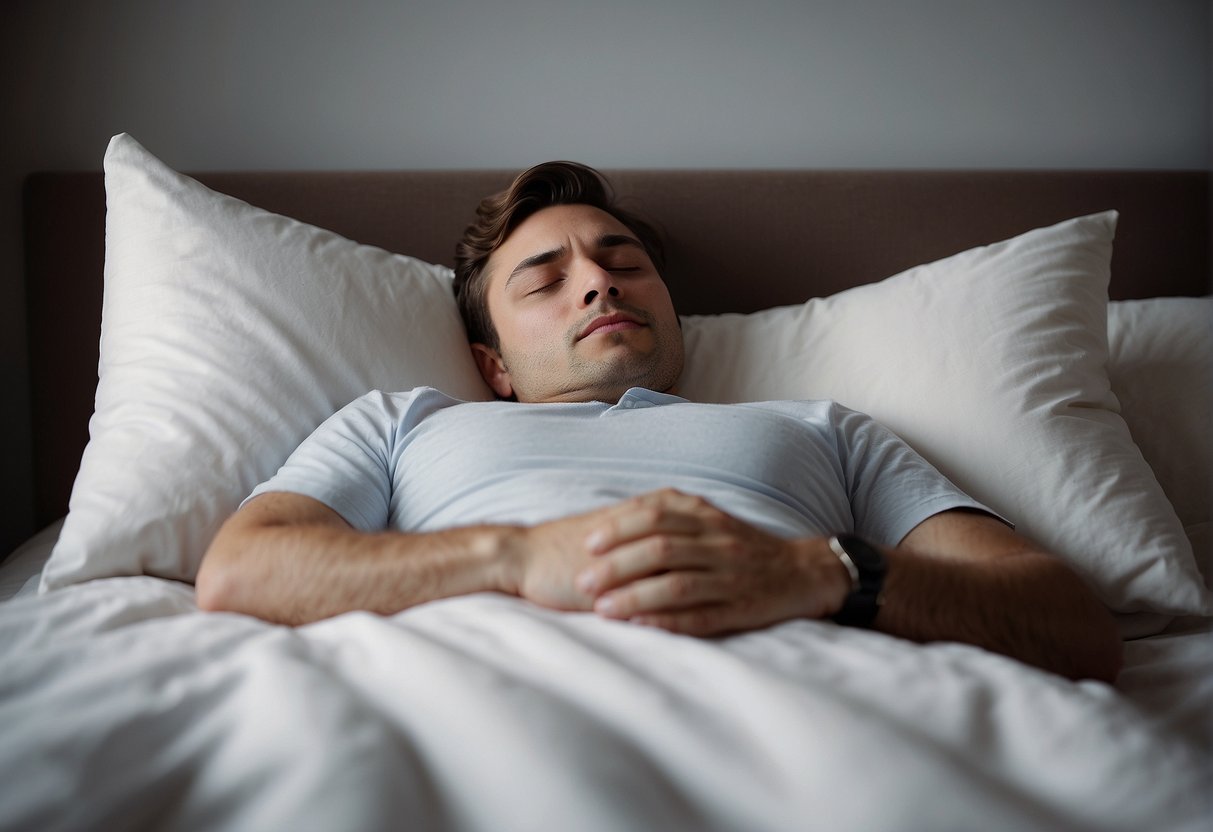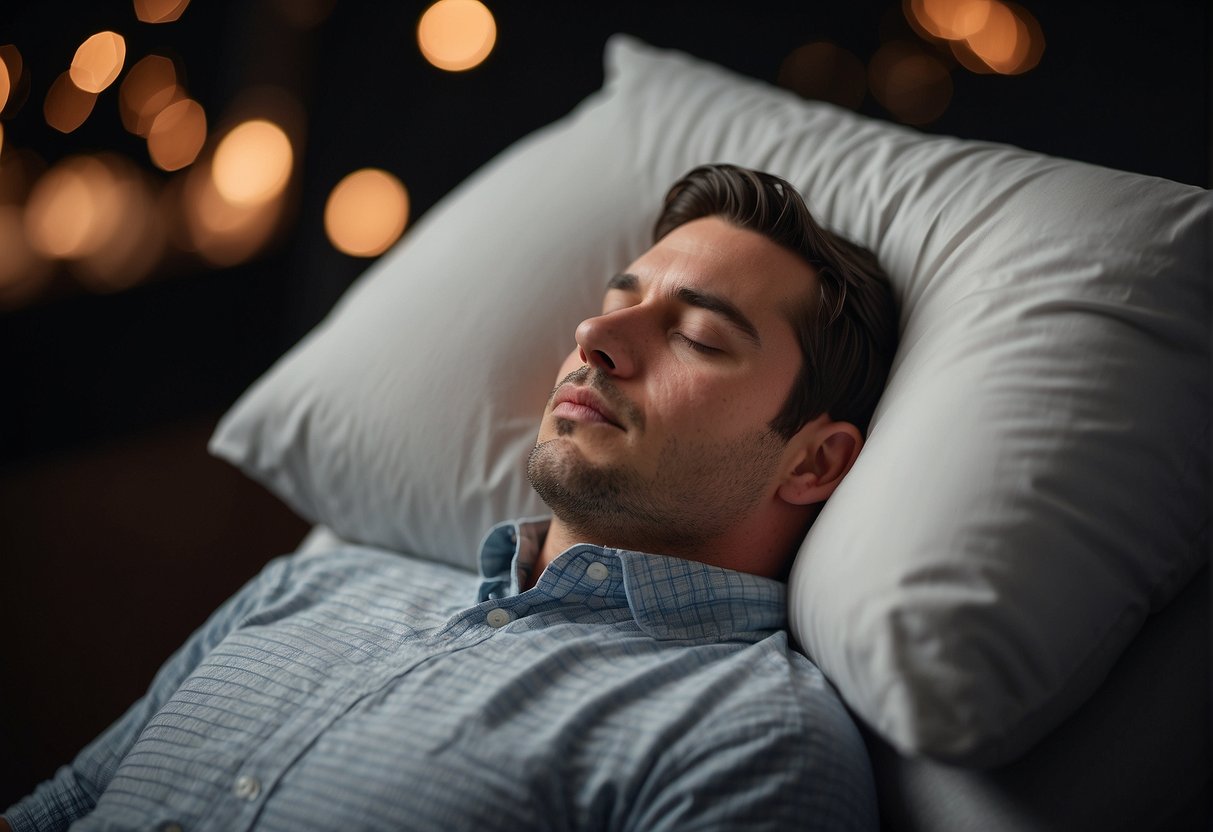If you are experiencing neck pain, it can be challenging to get a good night’s sleep. Neck pain can be caused by poor sleeping positions, posture, or underlying issues with the spine.
The position you sleep in can have a significant impact on the quality of your sleep and the level of neck pain you experience. Sleeping on your stomach can cause strain on the neck and spine, leading to stiffness and pain.
Sleeping on your back is generally considered the best position for those with neck pain, as it allows the spine to remain in a neutral position. If you prefer to sleep on your side, it is essential to choose the right pillow to help keep your head and neck in alignment with your spine.

Table of Contents
The Anatomy of the Neck and Spine
The neck is made up of seven small vertebrae that support the weight of the head and allow for movement. The spine is made up of 33 individual vertebrae that provide support and protection for the spinal cord. When the neck or spine is not properly aligned, it can cause pain and discomfort. Poor posture can also contribute to neck pain, as it puts additional strain on the muscles and ligaments in the neck and spine.
To prevent neck pain while sleeping, it is essential to maintain proper alignment of the spine and neck. This can be achieved by choosing the right sleeping position and using a supportive pillow. Additionally, it is important to practice good posture throughout the day, particularly when sitting for extended periods.
Best Sleeping Positions for Stiff Neck

Waking up with a stiff neck can be a discomforting experience that can ruin your entire day. Fortunately, there are ways to prevent and alleviate the pain. One of the most effective ways is to sleep in the right position. In this section, we will discuss the best sleeping positions for a stiff neck.
Side Sleeping with Proper Alignment
Side sleeping is one of the best positions for people with a stiff neck. However, it is important to maintain proper alignment to avoid further pain. To achieve proper alignment, use a pillow that is thick enough to keep your head and neck in a neutral position. This will help reduce the pressure on your neck and shoulders.
Back Sleeping for Support
Back sleeping is another great position for people with a stiff neck. It allows your spine to rest in a neutral position, which can help reduce pain and discomfort. To achieve proper support, use a pillow that is not too thick or too thin. A pillow that is too thick can cause your neck to bend forward, while a pillow that is too thin can cause your neck to bend backward.
Avoiding Stomach Sleeping
Stomach sleeping is not recommended for people with a stiff neck. This position can cause your neck to twist and turn, which can lead to further pain and discomfort. If you must sleep on your stomach, use a thin pillow or no pillow at all. This will help keep your neck in a neutral position.
In conclusion, sleeping in the right position can help alleviate the pain and discomfort of a stiff neck. Side sleeping with proper alignment and back sleeping with proper support are the best positions to sleep in. Avoiding stomach sleeping is also recommended. Using the right pillow for neck pain can also help reduce pain and discomfort.
Pillow and Mattress Selection
When dealing with a stiff neck, choosing the right pillow and mattress can make a significant difference in your sleep quality and pain relief. Here are some things to consider when selecting the right pillow and mattress for your needs.
Choosing the Right Pillow
When it comes to pillows, there are a variety of options available, including cervical pillows and memory foam pillows. However, the most important thing to consider is the level of support the pillow provides for your neck and head.
A good pillow should keep your neck and head in a neutral position, which means that your spine is aligned properly. This helps to minimize stress on your neck and prevent further pain or discomfort. A cervical pillow, which is designed specifically for neck support, may be a good option for those with a stiff neck.
The Role of Mattress Firmness
The firmness of your mattress can also play a role in your sleep quality and neck pain relief. A firm mattress can provide more support for your spine, which can be beneficial for those with a stiff neck. However, it is important to find a balance between firmness and comfort.
When selecting a mattress, it is important to consider your sleeping position. If you sleep on your back, a firmer mattress may be more suitable. If you sleep on your side, a softer mattress may be more comfortable.
In addition to mattress firmness, pillow support is also important. A pillow that is too high or too low can cause strain on your neck and exacerbate any pain or discomfort. It is important to find a pillow that provides the right level of support for your neck and head.
Pain Management Techniques
Dealing with a stiff neck can be uncomfortable and can affect your ability to sleep. Pain management techniques can help alleviate the discomfort and allow you to get a good night’s rest.
Heat Therapy and Cold Packs
Applying heat or cold to the affected area can help reduce pain and inflammation. A heating pad, for example, can help relax the muscles in your neck and improve blood flow to the area. You can also use a cold pack to reduce swelling and numb the area.
When using heat therapy, make sure to apply heat for no more than 20 minutes at a time. You can use a towel or cloth to protect your skin from direct heat. Alternatively, you can use a moist heat source like a warm shower or bath.
Cold packs, on the other hand, can be applied for up to 20 minutes at a time. Wrap the cold pack in a towel or cloth to prevent direct contact with your skin.
Medications and Natural Pain Relief
Over-the-counter pain relievers like ibuprofen and acetaminophen can help reduce pain and inflammation. Make sure to follow the recommended dosage and consult with your doctor if you have any underlying medical conditions.
Natural pain relief methods like massage and stretching can also be effective in reducing pain and promoting relaxation. Make sure to seek out a licensed massage therapist and consult with your doctor before trying any new treatments.
Lifestyle Adjustments for Neck Pain Relief
If you have a stiff neck, it can be challenging to get a good night’s sleep. Fortunately, there are several lifestyle adjustments you can make to alleviate neck pain and help you sleep better.
Exercises and Stretching
Physical therapy exercises and stretching can help relieve neck pain and improve mobility. A physical therapist can recommend exercises specific to your condition. A few simple exercises you can do at home include:
- Neck rotations: Slowly turn your head to the left and hold for a few seconds, then turn to the right and hold. Repeat this exercise several times.
- Shoulder rolls: Roll your shoulders in a circular motion, first forward, then backward.
- Chin tucks: Gently tuck your chin towards your chest and hold for a few seconds. Repeat several times.
Stress Reduction Strategies
Stress can exacerbate neck pain, so it’s essential to find ways to reduce stress in your life. Yoga and tai chi are two practices that can help reduce stress and improve flexibility.
Yoga involves gentle stretching and breathing exercises that can help reduce tension in the neck and shoulders. Some yoga poses that can help alleviate neck pain include the downward dog, the cat-cow stretch, and the child’s pose.
Tai chi is a gentle form of exercise that involves slow, flowing movements. It can help reduce stress and improve posture and balance.
In addition to these practices, there are other stress-reduction strategies you can try, such as deep breathing exercises, meditation, and mindfulness. By reducing stress, you can help alleviate neck pain and improve the quality of your sleep.
When to Seek Professional Help
If you have been experiencing a stiff neck for a prolonged period, it may be time to seek professional help. Chronic neck pain can be a sign of a more serious underlying issue, and it is important to address it promptly.
Physical therapy is a popular treatment for chronic neck pain. A physical therapist can help you improve your range of motion, strengthen your neck muscles, and alleviate pain. This type of treatment is often covered by insurance, so it may be a more cost-effective option than chiropractic treatment.
Chiropractic treatment can also be effective for chronic neck pain. A chiropractor can adjust your spine to alleviate pressure on your neck and improve your range of motion. However, this type of treatment is not always covered by insurance and can be more expensive than physical therapy.
If you are experiencing severe neck pain or other symptoms such as numbness or tingling in your arms or hands, you should seek medical attention immediately. These symptoms can be a sign of a more serious condition, such as a herniated disc or spinal cord injury.
According to the World Health Organization, neck pain is a common condition that affects people of all ages. In the United States, it is estimated that up to 70% of people will experience neck pain at some point in their lives. Therefore, it is important to take care of your neck and seek professional help if you are experiencing chronic pain or other symptoms.
Frequently Asked Questions
What is the best sleeping position for neck pain relief?
The best sleeping position for neck pain relief is on your back with a pillow that supports your neck’s natural curve. This position helps to distribute your body weight evenly and reduces pressure on your neck muscles. Sleeping on your stomach is not recommended as it can strain your neck muscles and cause pain.
Can certain pillow positions alleviate stiff neck symptoms?
Yes, certain pillow positions can alleviate stiff neck symptoms. Using a cervical pillow that supports your neck’s natural curve can help reduce neck pain and stiffness. Another option is to use a rolled-up towel or a small pillow to support the natural curve of your neck.
Is it advisable to sleep without a pillow for neck discomfort?
Sleeping without a pillow is not advisable for neck discomfort. Your neck needs proper support to maintain its natural curve and reduce pressure on your muscles. Sleeping without a pillow can cause your neck to bend unnaturally and lead to pain and stiffness.
What are effective methods to quickly alleviate a stiff neck?
Effective methods to quickly alleviate a stiff neck include applying heat or cold to the affected area, gently massaging your neck muscles, and doing neck stretches and exercises. Over-the-counter pain relievers can also help reduce pain and inflammation.
How long does a typical stiff neck last and what are the recovery tips?
A typical stiff neck can last from a few days to a week. Recovery tips include getting enough rest, applying heat or cold to the affected area, doing neck stretches and exercises, and taking over-the-counter pain relievers. If your symptoms persist or worsen, it’s important to see a doctor.
Are there any special considerations for sleeping with a pinched nerve in the neck?
Yes, there are special considerations for sleeping with a pinched nerve in the neck. Sleeping on your back with a cervical pillow that supports your neck’s natural curve can help reduce pressure on the affected nerve. Avoid sleeping on your stomach or using a pillow that is too high or too low. If your symptoms persist or worsen, it’s important to see a doctor.



